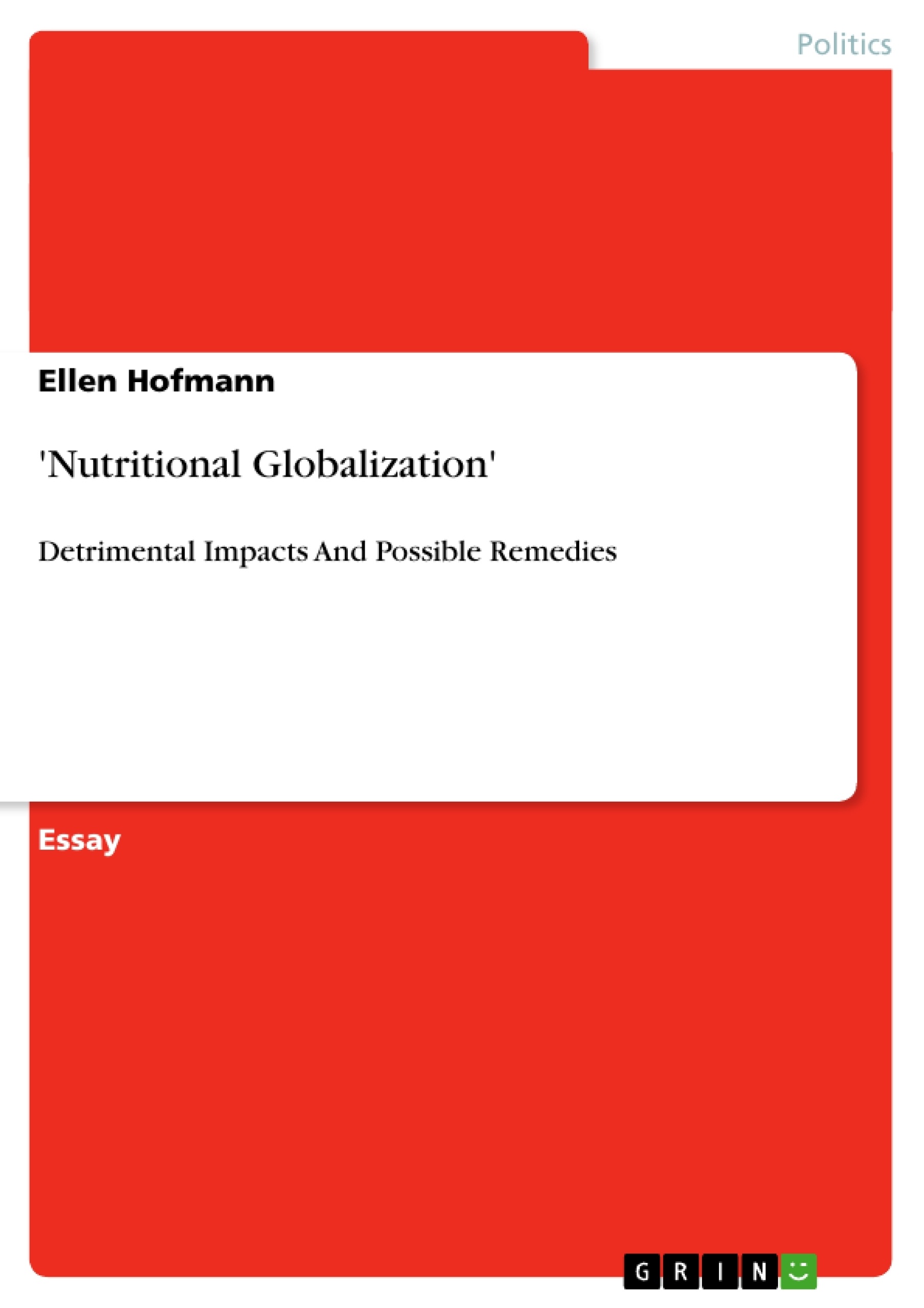The topic of this essay is ‘nutritional globalization’ –respectively, the detrimental impacts it can have on our daily lives. The notion of ‘nutritional globalization’ for the purposes of this essay will include the following aspects: first of all, nowadays all kinds of comestibles can be sourced worldwide without any problems (Lang, 1999). This development is based on several economic processes such as trade liberalization and tariff reductions. Thus, comestibles which could formerly only be found in Asia for example, are now available all over the world. Hence, it can be argued that food is slowly losing its roots in terms of identification of a certain comestible with a certain culture. Second, the global food market is increasingly controlled by multinational corporations forcing smaller national enterprises and family farmers out of business (Lang, 1999). The third meaning refers to the spread of fast food which can be observed throughout the world. The fourth and last meaning refers to food and eating habits as a part of culture and a means of communication. Thus, we will observe ‘nutritional globalization’ on an economic and a cultural level.
As will be demonstrated during the course of this essay, ‘Nutritional globalization’ as defined above has severe detrimental impacts not only on people’s health – which is reflected in the ever-increasing number of chronic degenerative diseases – but also on people’s social life.
Inhaltsverzeichnis (Table of Contents)
- Introduction
- Four major consequences of ‘nutritional globalization' - An overview
- Detrimental impacts on our health
- Cultural aspects of ‘nutritional globalization'
- The case of boredom
- Possible remedies to the problems of ‘nutritional globalization'
Zielsetzung und Themenschwerpunkte (Objectives and Key Themes)
This essay examines the detrimental impacts of 'nutritional globalization' on individuals' health and social lives. It explores how the globalized food system, including the widespread availability of diverse comestibles, the dominance of multinational corporations, and the proliferation of fast food, has contributed to negative consequences. The essay will investigate the connection between 'nutritional globalization' and the rise of "Western" diseases, the impact on cultural food practices, and the emergence of boredom in relation to food consumption. Finally, it will consider potential remedies to these problems, focusing on the Slow Food movement as a counter-force to the globalization of the food market.- Detrimental Impacts of 'Nutritional Globalization' on Health
- Cultural Dimensions of Food and 'Nutritional Globalization'
- Boredom and the Rationalization of Food Production
- The Slow Food Movement and Resistance to Globalization
- The Role of Multinational Corporations in Shaping Food Systems
Zusammenfassung der Kapitel (Chapter Summaries)
The essay begins with an introduction defining 'nutritional globalization' and its four major aspects: the global availability of comestibles, the influence of multinational corporations on the food market, the spread of fast food, and the cultural significance of food and eating habits. The main body of the essay then examines four major consequences of this phenomenon. The first section focuses on the detrimental impacts of 'nutritional globalization' on health, exploring the link between changing eating habits and the rising prevalence of "Western" diseases, such as obesity, heart disease, diabetes, and osteoporosis. The essay cites evidence from various studies, including research on the health of Australian aborigines and the migration patterns of Chinese and Japanese populations to the USA. The second section explores the cultural aspects of 'nutritional globalization,' highlighting how food serves as a means of communication and social interaction. It argues that the availability of a wide range of food options and the standardization of food production, particularly in the fast food sector, have led to a decline in the appreciation for quality food and the social significance of shared meals. The third section examines the phenomenon of boredom in relation to food, attributing it to the constant availability of various food options and the rationalization of food production. It argues that the standardization of food, particularly in fast food chains, has resulted in a loss of excitement and enjoyment associated with food consumption. The final section explores possible remedies to the problems of 'nutritional globalization,' focusing on the Slow Food movement as a counter-force to the globalization of the food market. It details the movement's goals and its broader significance in resisting the spread of fast food and promoting local food systems.Schlüsselwörter (Keywords)
The essay explores the multifaceted aspects of 'nutritional globalization,' examining its impact on both individual and societal health, cultural practices, and the global food market. Key terms and concepts include 'nutritional globalization,' "Western" diseases, cultural cuisines, fast food, boredom, rationalization of food production, Slow Food movement, and the role of multinational corporations in the food industry.Frequently Asked Questions
What is 'nutritional globalization'?
It refers to the worldwide sourcing of food, the dominance of multinational corporations in the food market, the spread of fast food, and the changing cultural habits regarding eating.
How does globalization impact human health?
It is linked to an increase in chronic "Western" diseases such as obesity, diabetes, heart disease, and osteoporosis due to standardized, processed diets.
What is the 'Slow Food' movement?
Slow Food is a counter-force to nutritional globalization that promotes local food systems, the appreciation of quality ingredients, and the social significance of shared meals.
Why does the essay mention 'boredom' in relation to food?
Boredom arises from the constant availability and standardization of food, leading to a loss of excitement and cultural identity associated with seasonal or local specialties.
What role do multinational corporations play?
They often force smaller national enterprises and family farmers out of business, leading to a rationalized and homogenized global food supply.
- Citar trabajo
- Ellen Hofmann (Autor), 2007, 'Nutritional Globalization', Múnich, GRIN Verlag, https://www.grin.com/document/149756



